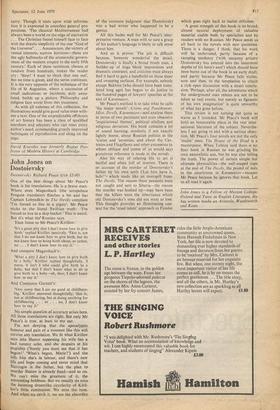John Jones on Dostoievsky
Dostoievsky Richard. Peace (cup £3.60) • One of the best things about Mr Peace's book is his translations. He is a brave man. Where even Magarshack (the scrupulous Penguin translator) flinches a bit and has Captain Lebyadkin in The Devils complain 'I'm forced to live in a pigsty', Mr Peace sticks to the literal Swiftian truth : 'I'm forced to live in a slop bucket.' This is weird. But it's what the Russian says.
Then listen to Mr Peace's Kirillov:
'It's a great pity that 1 don't know how to give birth,' replied Kirillov pensively. 'That is, not that I do not know how to give birth, but do not know how to bring birth about, or rather, no . . I don't know how to say' it.'
And compare Magarshack's:
'What a pity I don't know how to give birth to a baby,' Kirillov replied thoughtfully. 'I mean, it isn't I who could give birth to a baby, but that I don't know what to do to give birth to a baby—oh, dear, I don't know how to say it.'
And Constance Garnett's:
'Very sorry that I am no good at childbear- ing,' Kirillov answered thoughtfully; 'that is, not at childbearing, but at doing anything for childbearing . . . or . . . no, I don't know how to say it.'
No simple question of accuracy arises here. All three translations are right. But only Mr Peace's is true, at least to my ear.
I'm not denying that the apocalyptic humour and pain of a moment like this will survive any translation. We fit what Kirillov says into Shatov supposing his wife has a bad tummy ache, and she despairs at his stupidity ('Surely you must see that it has begunl"What's begun, Marie?') and she tells him she's in labour, and there's new life and hope coming and never mind that Stavrogin is the father, but the plan to murder Shatov is already fixed—and so on. We can't miss the greatness of it, the astounding boldness. But we usually do miss the haunting dreamlike circularity of Kiril- lov's little rumination. We miss the tune. And when we catch it, we see the absurdity of the common judgment that Dostoievsky was a bad writer who happened to be a genius.
All this bodes well for Mr Peace's inter. pretative venture. A man with so sure a grasp of his author's language is likely to talk sense about him.
And so it proves. The job is difficult because, hOwever wonderful the detail, Dostoievsky is finally a broad brush man, a builder-up of huge block impressions and dramatic contrasts; and criticism must always find it hard to gain a handhold on those sheer and sweeping surfaces. For example, nobody except Bakhtin (who should have been trans- lated long ago) has begun to do justice to the hundred pages of lawyers' speeches at the end of Karamazov.
Mr Peace's method is to take what he calls 'the major novels'—Crime and Punishment, Idiot, Devils. Karamazov—and analyse them in terms of two persistent and even obsessive `inspirational themes', political nihilism and religious deviation. His book contains a lot of sound learning, modestly if not exactly lightly borne, about Russian politics in the 'sixties and 'seventies, and about the Cas- trates and Flagellants and other extremists to whom oblique and (some of us would say) gratuitous reference is made in the novels.
Also his way of relating life to art is tactful and often full of interest. There is an account of the murder of Dostoievsky's father by his own •serfs Met him have it, lads!') which reads like an overspill from The Devils. The reason these peasants were not caught and sent to Siberia—the reason the murder was hushed up—may have been that the killers were the inheritance which old Dostoicvsky's sons did not want to lose. This thought provides an illuminating con- text for the 'cruel talent' approach to Fyodor which goes right back to tsarist criticism.
A great strength of this book is its broad, almost neutral deployment of valuable material usable both by specialists and by readers with no Russian. Mr Peace sends us all back to the novels with new questions. There is a danger, I think, that his work will be underrated, partly because of a vamping tendency ('with uncanny artistry Dostoievsky has entered into the innermost depths of his hero's soul') which should have been burnt out of the book in an early draft, and partly because Mr Peace falls victim, now and then, to the temptation to clinch a rich open discussion with a smart conclu- sion. 'Perhaps, after all, the adventures which the underground man relates are not to be taken as real events, but merely as figments of his own imagination' is quite unworthy of what has gone before.
This review is not turning out quite as warm as I intended. Mr Peace's book will hold an honourable place in the vast inter- national literature of the subject. Neverthe- less I am going to end with a serious abjec- tion. Mr Peace's four novels are not the only 'major' ones. The House of the Dead is a masterpiece. When Tolstoy said there is no finer book in Russian he was grinding his own naturalistic axe, but he was also telling the truth. The power of certain simple but ultimate physicalities—the well-soaped rope at the end of The Devils, the pound of nuts in the courtroom in Karamazov—escapes Mr Peace because he ignores that book. Let us all read it again.
John Jones is q Fellow of Merton College, Oxford and Tutor in English Literature. He has written books on Aristotle, Wordsworth and Keats


































 Previous page
Previous page